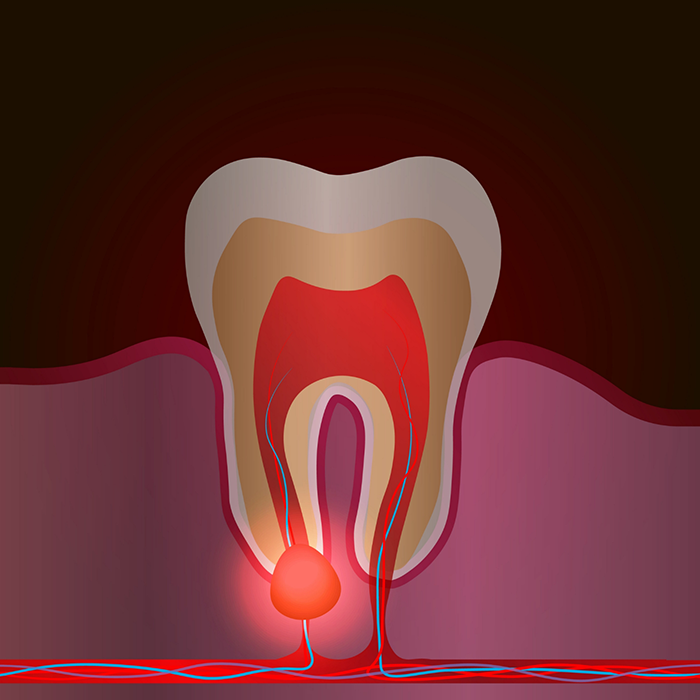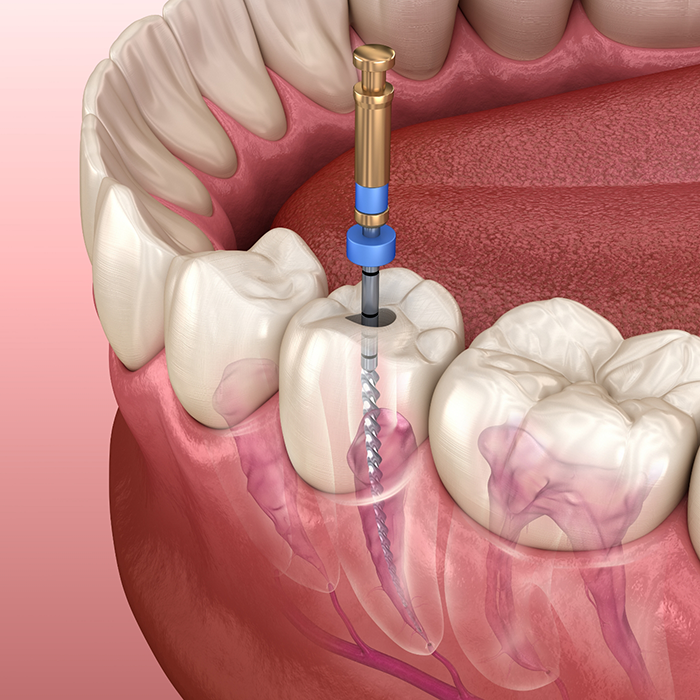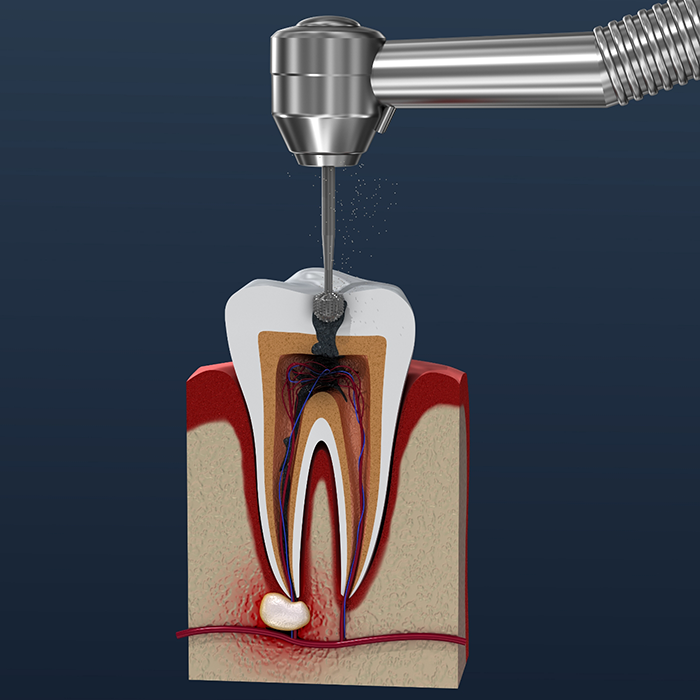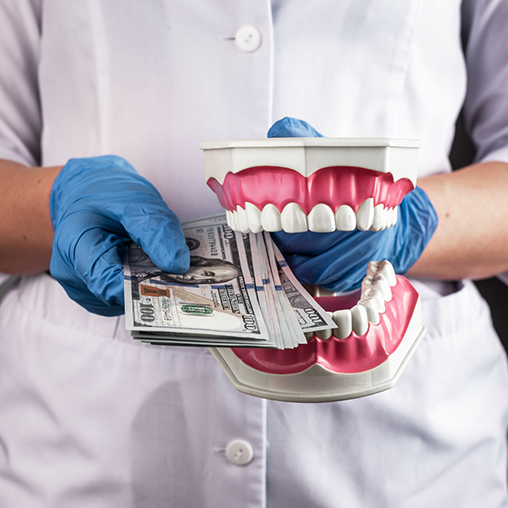Root Canal Treatment Midwest City
Eliminate the Source of Tooth Pain

Does drinking iced tea or hot coffee cause you pain? Maybe one of your teeth has simply been hurting constantly for a while now. In either case, it would seem you are dealing with an infection inside the dental pulp – the bundle of nerve endings located at the center of your tooth. Since this area is so sensitive, it can cause discomfort to the degree that it interferes with your daily life. Fortunately, Dr. Kendrick can relieve your tooth pain and give you a reason to smile once again with the help of root canal treatment!
You may associate root canals (endodontic treatment) with being very painful, but with Dr. Kendrick’s experienced hand, there is really nothing to fear from undergoing the common restorative treatment in our Midwest City dental office. In fact, a root canal is often the last option for saving a tooth from extraction. If you suspect you may require this type of treatment, call our office today to schedule an appointment.
Why Choose Midwest City Dental Center for Root Canal Treatment?
- Advanced Dental Technology to Create Added Comfort
- We Will Maximize Your Available Dental Benefits to Help You Save
- Locally Owned & Operated Dental Practice Focused on Patients’ Needs
Do I Need Root Canal Treatment?

The most common indication of the need for a root canal is a severe, persistent toothache. However, that is certainly not the only symptom to look for. Other signs you might need a root canal include:
- Extreme, prolonged sensitivity to hot or cold foods or beverages
- Sharp pain when biting down
- Dark discoloration of a tooth
- Swelling or redness of the gums surrounding a tooth
- A pimple-like bump on the gums near a tooth
As soon as you notice any of these symptoms, contact our team. We’ll get you in for an appointment ASAP.
The Root Canal Process

The term “root canal” gets a bad rap, but this procedure is actually painless. In fact, by removing the infected nerve of the tooth, a root canal is designed to relieve pain. Plus, your restorative dentist in Midwest City will numb your mouth with a local anesthetic beforehand so you will remain comfortable throughout the process.
We will begin by using special instruments to access the inner chambers of the tooth and remove the pulp that’s triggering your pain. After sanitizing the area, we’ll refill it with a synthetic gutta-percha material to retain the tooth’s shape. The next step is to seal and protect the tooth by placing a temporary dental crown. As your mouth heals, the area around the tooth might feel a bit sore and tender.
A few weeks later, we will see you at our dental office. Then, we’ll switch out your temporary crown for a permanent one. At that point, the underlying tooth should be fully protected. You’ll be able to use it as you normally would – bring on that cup of coffee!
The Benefits of Getting a Root Canal

While replacement options like dental implants definitely have their benefits, preserving your natural tooth should always be the primary goal. If you hesitate to get a root canal when you need one, the infection might progress to the point of no return, and your tooth will have to be extracted entirely. Removing and replacing a tooth is a much more complex, time-consuming, and wallet-draining venture than root canal treatment.
In addition to saving your natural tooth, root canal treatment has other benefits:
- Virtually pain-free procedure: Thanks to the advanced dental technology we use, getting a root canal is about as comfortable as the process for an ordinary filling.
- High success rate: The vast majority of root canal patients retain their treated tooth for decades, if not the rest of their lives.
- Aesthetically pleasing results: After your root canal, your tooth will be restored with a custom-made dental crown that seamlessly blends in with the rest of your smile.
Understanding the Cost of Root Canals

If you’re like most patients, you might be concerned about two things when it comes to root canal treatment: pain and price. The good news is that you don’t have to stress about either when you visit Dr. Kendrick and our talented Midwest City dental team. In this next section, we’re going to be covering important information about the cost of root canal treatment but rest assured that we’re always here to answer any questions you have if you’d prefer to give us a call.
Factors That Can Affect Root Canal Cost

Patients are sometimes surprised to hear that there isn’t a one-size-fits-all answer when it comes to the cost of root canal treatment. That’s because no two treatment plans are exactly the same! When making yours, we need to keep in mind:
- The location and type of tooth
- If any other restorative dental care is needed
- The complexity of your case
- The type of restoration needed to protect your tooth moving forward
Is it Cheaper to Pull My Tooth?

At first, it may look like having your tooth pulled is cheaper. That’s because the cost of a tooth extraction doesn’t include the necessary follow-up services, like a dental bridge or dental implant. In other words, root canal treatment is almost always cheaper. Plus, root canal treatment saves your tooth, eliminates the infection, and restores the function of your smile simultaneously. With all of that said, you’re more than welcome to bring any questions you have to us about your treatment options; we’re here to help you decide what’s best for your smile.
Does Dental Insurance Cover Root Canal Treatment?

Dental insurance providers almost always cover a portion of the cost of essential restorative care, including root canal treatment. So, you should absolutely read through the fine print on your plan! If you need any help understanding what is and isn’t covered, you can ask us for help too. We are in-network with several popular providers, including Aetna, Cigna, and Delta Dental, which makes the process of understanding and using your available benefits incredibly easy.
Other Options for Making Root Canal Treatment Affordable

If you don’t have dental insurance, ask us about our other financial solutions, including:
- Flexible Financing: CareCredit is a third-party financier that offers several payment plans with little to no interest attached. So, you don’t have to pay for root canal treatment in one lump sum; you can space out the cost into monthly chunks instead.
- In-House Membership Plan: When you join our in-house membership plan, you get immediate access to perks like a $25 rollover reward. You also get significant discounts on services completed at our office, including essential restorative care.
Root Canal FAQs
Are Root Canals Painful?
Root canal treatment may have a reputation as being painful, but the truth is that modern dental technology and techniques have come a long way. These days, getting a root canal is about as comfortable as getting a cavity filled. Moreover, root canal treatment is actually designed to relieve intense tooth pain by eliminating the infection within a tooth. Before the procedure, Dr. Kendrick will numb your mouth to ensure you’re comfortable from the very beginning.
After your root canal, the area around the tooth might feel sore or sensitive for the next few days. The discomfort should start to fade after two or three days. During this initial recovery period, you can take over-the-counter pain relievers like ibuprofen and apply a cold compress to your cheek off and on. If your pain worsens instead of getting better after three days, it could be a sign of a complication. If this happens, give our office a call right away.
What Happens If You Wait Too Long for a Root Canal?
Unlike the rest of the body, teeth cannot heal themselves. If left untreated, a tooth infection will only get worse with time, not better. That is why it’s so important to schedule a root canal as soon as possible after your dentist in Midwest City tells you that you need one. Even if the tooth pain disappears, that doesn’t mean you can skip root canal treatment. In fact, this often indicates that the infection has destroyed the tooth’s nerves, leaving them unable to register pain. Waiting too long to get a root canal when you need one could allow the infection to spread to the rest of your body, where it could cause systemic illness. The tooth might also become so damaged that it has to be extracted.
Do I Need Antibiotics Before or After My Root Canal?
Dr. Kendrick will go over your medical history with you beforehand to determine whether prescribing antibiotics for you is a good idea. While every case is different, most patients do not need to take antibiotics before or after getting a root canal. However, antibiotics may be prescribed before your root canal if you have a health condition that increases your risk of developing an infection after a major dental procedure.
Can Root Canals Be Prevented?
The best way to prevent the need for a root canal in Midwest City is to take great care of your oral health. You can protect your teeth from infection through daily brushing, flossing, and mouthwash use as well as regular dental checkups and cleanings. To avoid dental trauma, wear a mouthguard when playing sports and a nightguard if you grind your teeth while you sleep. If a tooth is chipped or cracked, bacteria have an easier time accessing the pulp, resulting in the need for another root canal. Finally, you can reduce the amount of harmful bacteria around your teeth by eating lots of nutritious foods, limiting sugar, and drinking plenty of water.
